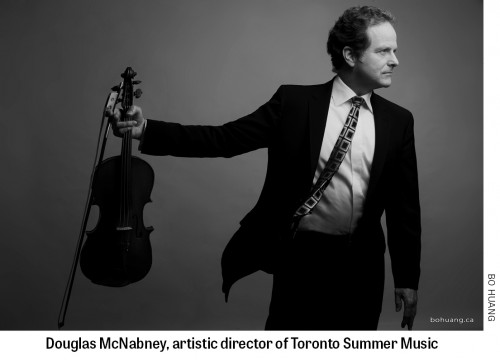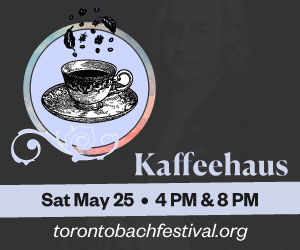 When Douglas McNabney dropped by The WholeNote office a week or two ago, it was mainly just to set up a time to sit down later in June and have a conversation – a filmed Conversation@TheWholeNote, for our YouTube series, to be exact – about his vision for this year’s Toronto Summer Music Festival. However, as often happens in these kinds of situations, one thing led to another and before we were aware of it, our conversation had already begun. In this particular case, it was especially easy to get carried away – this is the tenth anniversary year of Toronto Summer Music and McNabney’s fifth year of his tenure as the festival’s artistic director. From the look of the programming in place, this festival will have a presence in Toronto’s musical landscape this summer that will be tough to ignore.
When Douglas McNabney dropped by The WholeNote office a week or two ago, it was mainly just to set up a time to sit down later in June and have a conversation – a filmed Conversation@TheWholeNote, for our YouTube series, to be exact – about his vision for this year’s Toronto Summer Music Festival. However, as often happens in these kinds of situations, one thing led to another and before we were aware of it, our conversation had already begun. In this particular case, it was especially easy to get carried away – this is the tenth anniversary year of Toronto Summer Music and McNabney’s fifth year of his tenure as the festival’s artistic director. From the look of the programming in place, this festival will have a presence in Toronto’s musical landscape this summer that will be tough to ignore.
Think of what follows as a taste of a “Conversation” to come, where McNabney will be catching up with WholeNote publisher David Perlman to talk about the business of curating a city’s music, brand-new opportunities for amateurs to get involved in the festival scene, and how to cope – or even take advantage of – the coming Panamania. Until the time comes, however, here is a little of what has been on McNabney’s mind, and on ours, as festival season swings into full gear.
WN: For now, let’s get a sense of the festival, and of the shape of it.
DM: The one thing that struck me about putting together this year’s program – because it’s huge – is that the amount of music that I wanted to include is totally unmanageable. Usually we’re dealing with the same body of literature, standard 19th-century chamber music literature and a little bit of excursions outside of that, and then I take a focus point in on one particular aspect or country or something like that. This year because of the Pan Am Games, we said, okay, we have to do music of the Americas. And instead of focusing in, it’s gone completely way out of our traditional literature, which has been really fun. But when you start down that road, it’s a little bit frightening how far and how many different branches there are.
There are a lot of musicologists at McGill and I think even with the musicologists nowadays, for the 19th century their minds are exhausted. Everybody’s done that, it’s as if there’s not much left to dig for there, and so everyone’s gone on to thinking about what’s happening in America in the 20th century. Of course there are people like Taruskin leading this charge that 1,000 years of western music have actually come to an end and what we have is American popular culture, and that’s what’s ahead of us now. I don’t necessarily believe that, but certainly there are aspects of that idea that reach this project.
...On breaking down musical (theatre) walls:
DM: We’re doing a little bit of jazz at the festival and we’re doing the quintessential American operatic form, which is the musical.
WN: Which work is that?
DM: It’s The Last Five Years, by Jason Robert Brown, and it’s a fantastic piece. It’s only two people, it’s a couple that meets, falls in love, gets married and breaks up, all in five years. It’s told from the beginning by the man and from the end by the woman; they only meet in the middle at their wedding and that’s the only time they sing together. It’s very clever.
Aaron Sheppard is one of the new tenors in the Canadian Opera Company Ensemble Studio, and he does musical theatre. He and his girlfriend Vanessa Oude-Reimerink have been singing this musical together for the last three years, so they know the piece really well. I’m hoping that through these various connections we can actually bring our opera audience in to think about the musical on a different level. To take it more seriously rather than turning up their noses at a musical, to really think, okay well wait a second, there’s something very interesting happening in this art form, when it’s done well, performed well. For that matter, there’s a lot of opera that is fluff; you wouldn’t want to take a lot of opera seriously either.
WN: There’s a sense of breaking down walls with traditional audiences of either kind of genre.
DM: The walls are certainly being broken down. Even at the Glimmerglass Festival they did Annie Get Your Gun. And I think more and more we’re going to see opera companies and opera schools incorporating these works which have been around for basically 100 years now.
...On bringing in the star performers:
WN: Have you got some performers coming in this year who you’ve been chasing since year one or two or three, and you can say, “now I’ve got it, now this is the theme where I can bring them in”?
DM: Yes. Karita Matilla. But actually, Karita Matilla has nothing to do with the theme. I’ve been after her for three years. This is the year it happened.
WN: Not even for the encore?
DM: No, the diva sings what she wants to sing. The same thing with Garrick Ohlsson. He’s one of my favourite pianists...when I was a youngster the first year I joined the Quebec Symphony as principal viola, my first real job out of school, he came and played Prokofiev Third with the orchestra and I’ll never forget that. He’s been one of those guys who I’ve always admired. Well, he’s doing Beethoven and Scriabin. Can’t do anything about that either. But this is the 100th anniversary of Scriabin and that’s his project for this year. That’s always the way. The festival theme is there and I try to tie as much as I can in, but it’s inevitable. It’s inevitable on some levels.
...And on getting geared up for a little unprofessional music-making:
DM: The other big news for this summer is our new amateur Community Academy. What I’m really loving is the way that musicians are buying into it too...we’ve really hit a chord. James Anagnoson’s piano class is oversold already. We just need a few more voices for the choir and we need a few more string players.
WN: And you’re going to do a breakfast choir?
DM: Absolutely. Everybody will be participating – including the staff, though they don’t know this yet. Everybody’s got to be there. Matthias [Maute] is the conductor, and Laura [Pudwell] will be doing coaching and masterclasses. Everybody all together in the morning, and have a coffee and a croissant or whatever, and then from 10 o’clock everybody goes into their particular program, but there’s this one moment where everyone gets together and just makes music.
Sounds like a worthy idea – and sounds like a subject to bookmark for our next discussion. Until then, thanks to McNabney and to his colleagues – and here’s to those moments that will make Toronto’s upcoming summer a musical one.



